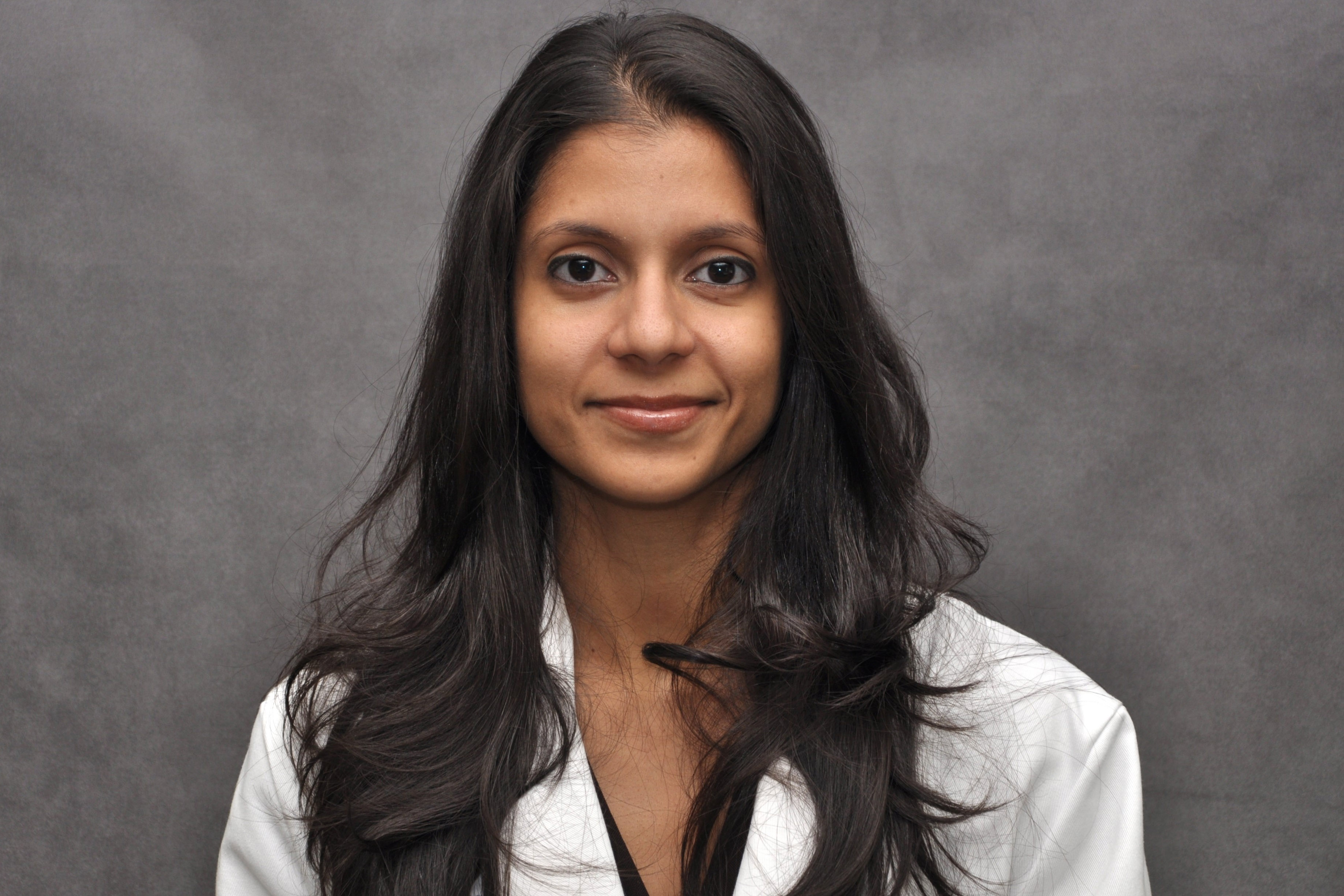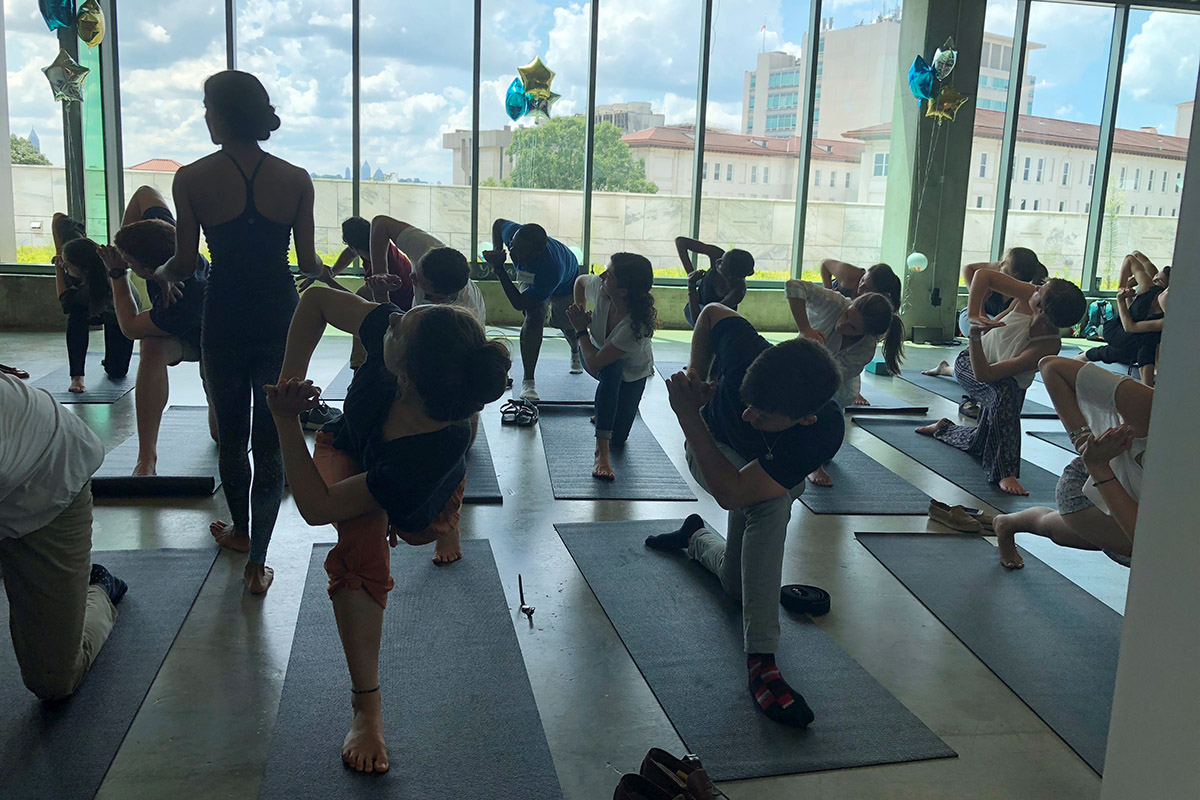Finding the Right Balance

What do yoga and Hurricane Maria have in common? Carla Haack. The young surgeon’s life has been profoundly impacted by both.
Haack started dabbling in yoga when she was a medical student in Puerto Rico as a way to reduce stress. She certainly needed a way to bring down the cortisol—she had been running as hard as she could her whole life.
After moving from Atlanta to her mother's hometown in Puerto Rico when she was 10, Haack was home schooled for two years. Since she could work at her own rapid pace, she completed four grades during that time, enabling her to graduate high school at 15. She enrolled in a nearby college having already decided she wanted to be a doctor, so she figured out the credits she needed to apply to medical school. As soon as she earned them, she applied to University of Puerto Rico School of Medicine and was accepted. She was 19.
"I don't actually have a college degree, but I do have a medical degree," says Haack.
Haack came to Emory for her residency in general surgery, where she kept up her pace. She was named a Grady Memorial Hospital Healthcare Hero by the Grady Health Foundation during her chief residency and received the David V. Feliciano Teaching Award.
In 2013, she helped create the content for Emory's patient education app "Come Clean: Stop Surgical Infections Before They Start," which educates patients on wound care and how to reduce their risks for surgical site infections. Through it all, she cared for patients.
"When I was a young faculty member, I wanted to give everything to my patients," says Haack. "As a result, I was doing a really bad job of saving anything for me. I had just started my career, but I was rapidly burning out. I was not going to be able to sustain it."

Carla Haack started a free yoga class for Emory faculty, staff, and students at Emory University Hospital. She sees yoga as “improving the connection between mind and body.”
She took a year off to recharge, using the time to become a certified yoga instructor. She returned refreshed and, in her mind, a better surgeon: "Yoga is about improving the connection between mind and body and allowing me greater mastery over my body," she says. "Ultimately, that is something I want to bring to the OR."
She also wanted to share the physical/mental/ spiritual practice with her fellow health care workers and got an unexpected assist from a grateful patient. Businessman and philanthropist Henry Tippie credited Haack with saving his life following a successful operation and, in gratitude, endowed her position (she is the Henry B. Tippie Clinician Scholar) and donated $2 million to the medical school to be used at her discretion.
"Suddenly my idea for a yoga program for health care workers got a lot more real," says Haack.
She hired a yoga instructor who leads a free class in unfinished space in the hospital tower five days a week. "I'd like to expand beyond health care workers and include patients' families," she says. "They are enduring some of the most incredible stress, and I'd like to equip them with tools to help them deal with it."
Haack's yoga message is spreading. Two years ago, the medical school made an hour-long yoga class led by Haack part of the mandatory orientation for all incoming students, and the physician assistant program signed on this year. "We tell them, yoga might not be for everyone," she says, "but you need to figure out what is going to preserve your sanity and do it."
All the yoga in the world, however, could not keep the stress at bay two years ago when Hurricane Maria struck Puerto Rico, where Haack's parents, grandparents, sister, and cousins still live. The storm knocked out communications on the island, so it was five agonizing days before the first photos of her parents' town started coming out.
"I had been telling myself they were okay—their house was made of concrete and they were not in a flood plain," she says. "The very first picture I saw from their town was of a concrete pillar, and it was shattered like a toothpick. I lost it. It was about three more days before I finally got a call from my mother. Everyone was okay."
She knew she needed to help, so she put a note on the Department of Surgery listserv. Money poured in, which she used to buy survival gear, medications, and water filters. A colleague put her in touch with MedShare, an Atlanta nonprofit that donates surplus medical supplies and equipment, and she gathered more items. What she still needed, however, was a way to get to Puerto Rico.
About two weeks after the storm, she was told she could have a seat on a private flight that left in two days. Once she landed, Haack and her colleagues on the plane headed to the western end of the island where help had not yet arrived. They ran clinics in fields and pastures, climbed fences and forded rivers to get to people trapped in their homes, and lent a hand at local hospitals.
"The response of the medical community in Puerto Rico was amazing," she says. "If you could get to the hospital, you could have emergency surgery, even if it was in the dark. Surgeons were operating by the light of their cellphone flashlights. Residents were living at the hospital, 10 to a call room. Medical students were cleaning the facility."
Haack knew her trip could not be a one-off. She took a pay cut in exchange for taking one week off every month to return to Puerto Rico. She has developed strong ties with local nonprofits and community organizations.
MedShare transitioned from letting her take all she could carry to sending her with whole shipping containers full of supplies for hospitals. "My little duffle bag mission has really grown," she says.
This past summer, Haack took a team of Emory med students for a two-week visit, where they delivered supplies, treated patients, and renewed prescriptions.
Today Haack sees both progress and setbacks. "From a medical standpoint, most of the patients I see now have a primary care provider and their prescriptions, which is huge progress," Haack says. "On the other hand, with the instability of the government—we had three different governors in the space of one week—some safety nets are crumbling. But Puerto Ricans are resilient."




